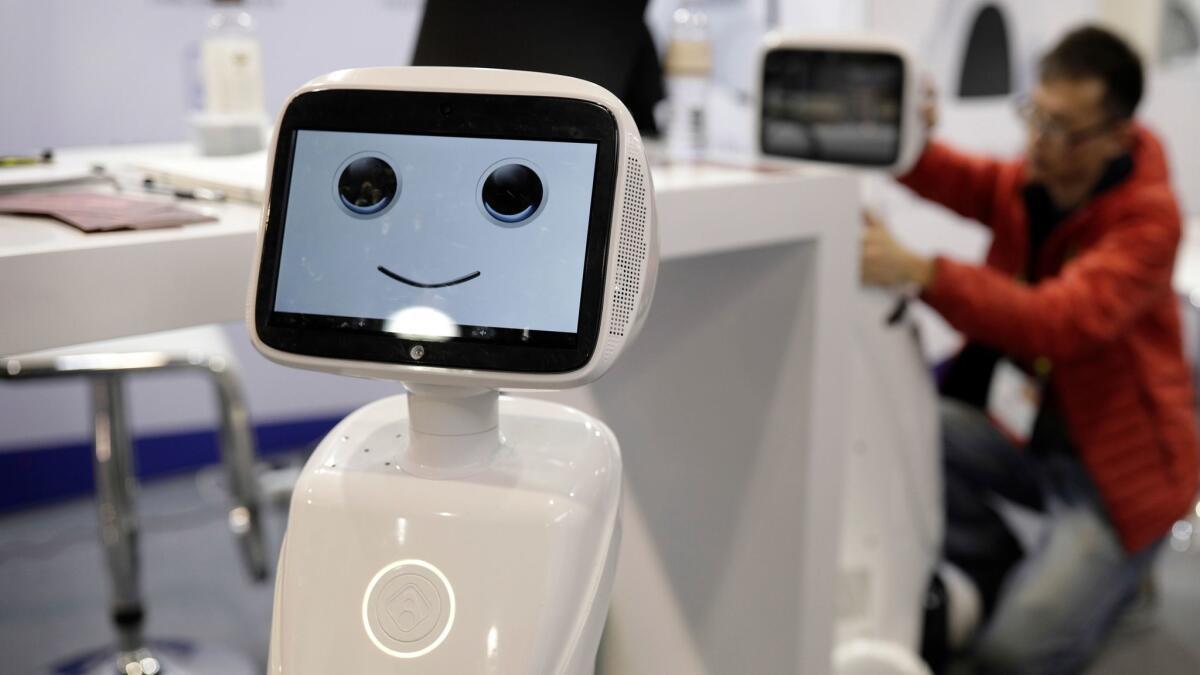Editorial: Ushering in our new robot overlords, one appliance at a time

This year’s International Consumer Electronics Show, which wrapped up Sunday in Las Vegas, was an orgy of smarts — “smart” Internet-connected appliances, smart television sets, smart lawn mowers, smart … everything.
The industry’s vision of a world of interconnected, programmable devices has become a reality, thanks in part to the ubiquity of broadband Internet connections and the availability of inexpensive chips, sensors and batteries. And the devices do more than just talk to each other. They collect information about the world around them, they learn, they adapt.
Robot vacuum cleaners that learn your house’s floor plan. Heating and cooling systems that figure out which rooms to heat or cool automatically over the course of the day. Cars that recognize who gets into the driver’s seat, then customize everything from traffic information to radio stations accordingly.
As a gadget lover, I was both awed by this trend and unnerved by it in almost equal measure. Take, for example, the sensor-laden “beloved car” concept being demonstrated by Toyota. The company says it will use “deep learning technology to comprehensively recognize a person’s condition based on facial expression, behavior, vocal sound and biological data” collected inside its cars. The vehicles would then do something to rouse or relax the driver as needed, such as striking up a conversation — presumably, not along the lines of HAL in “2001: A Space Odyssey” — if the driver is nodding off, or playing a string quartet if traffic is making the driver stress out.
There are real privacy issues raised by the increasing amount of data-gathering in the home, the car and everywhere else we go.
Although I’d fall in love with a car if it simply stayed out of the repair shop, I can easily see the appeal of technology that makes drivers safer and less rage-fueled. More broadly, devices that learn about their users and adapt themselves over time to their owners’ demands are clearly an upgrade from one-size-fits-all gadgets that rapidly become outdated because they can’t keep up with the changes in technology.
Yet there are real privacy issues raised by the increasing amount of data-gathering in the home, the car and everywhere else we go. Companies typically pump the data they collect to servers online, where it can be analyzed more effectively than in the home or the car. Yet as we’ve seen time and time again, data stored online is more vulnerable to hackers than, say, the information collected on a portable music player. How valuable it is depends on how sensitive it might be — for example, if it’s stored with other personal information, such as a credit card number.
That’s why responsible companies encrypt the personal data they store. But the data a company collect about your moods behind the wheel may also be quite valuable to third parties — such as, in this case, auto insurers, which might link your premiums to how often you have to be roused en route. Can you trust the manufacturer not to sell it to them? And will you even know whether it’s happening? Companies routinely disclose their plans for the data they collect, but when was the last time you read through the fine print of a privacy policy before approving it?
In addition, the data that gadgets record and send to a company’s servers online will probably be available with a court order to law enforcement officials and people who’ve filed lawsuits. If companies don’t regularly discard the information they collect or remove personally identifying features, their products will inadvertently serve as surveillance tools — but without necessarily providing enough context to distinguish innocent behavior from incriminating acts.
Again, consumers may be perfectly happy to share their personal data in exchange for a more useful product or service. And allowing companies to use data can lead to welcome new applications and features. I have an Amazon Echo, which does a growing number of tasks for me in response to the commands I utter. New capabilities pop up every week. Amazon records the Echo’s interactions with me so that it can improve its voice-recognition software, and I’m all for that. What I do mind is that Amazon keeps those electronic records forever unless I tell it to forget them.
Of course, you don’t need individually identifiable data to refine existing products and create new ones. Will companies be willing to anonymize the personal information hoovered up by their products’ sensors and stored in their servers if it means sacrificing some profit? They will if the public demands it. That’s something to keep in mind when the smart devices shown off in Las Vegas start showing up at stores and dealerships near you.
Follow the Opinion section on Twitter @latimesopinion and Facebook
More to Read
A cure for the common opinion
Get thought-provoking perspectives with our weekly newsletter.
You may occasionally receive promotional content from the Los Angeles Times.











